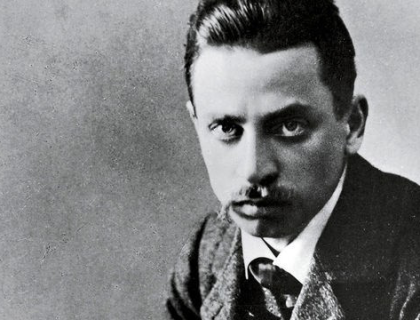The Panther

.
.
A recent article in the New York Review of Books made me curious about Reiner Maria Rilke, the German Poet. It made me realize that I know very little of him.
For instance, I cannot remember Rilke as having ever been a subject of the German literature class in my high school. Perhaps because he and Heinrich Heine were still outcasts since they had deserted the German Vaterland to take residence in France — though, in the 50s when I attended high school, the terrible legacy of German nationalism was starkly on everyone’s mind, and the old grudge against the ex-patriates should have been forgiven and forgotten.
It turns out from the article that Rilke was ‘a bounder’ — a word no longer in use, and hence unknown to me — meaning ‘dishonorable man.’ He was a womanizer, neglected his only daughter, abused the hospitality of his friends, and justified every one of his steps or missteps by pointing to his higher vocation to tell the poetic truth.
From the article he seems, as we would say very plainly, an asshole, and to this day the eternal quality of his poetry has been his only redemption.
Inspired by reading about Rilke, I tried to take on a self-imposed challenge. I took one of his widely known poems, der Panther, and translated it from Mitchell’s English translation back to German. The question was how far the back-translation resembled the poet’s original.
(I asked this question, and looked closely at the craft of translation, since lately I have taken on the task of translating an entire collection of English-language poetry into the German).
Der Panther
Sein Blick ist vom Vorübergehn der Stäbe
so müd geworden, daß er nichts mehr hält.
Ihm ist, als ob es tausend Stäbe gäbe
und hinter tausend Stäben keine Welt.
Der weiche Gang geschmeidig starker Schritte,
der sich in allerkleinsten Kreise dreht,
ist wie ein Tanz von Kraft um eine Mitte,
in der betäubt ein großer Wille steht.
Nur manchmal schiebt der Vorhang der Pupille
sich lautlos auf—. Dann geht ein Bild hinein,
geht durch der Glieder angespannte Stille—
und hört im Herzen auf zu sein.
–Reiner Maria Rilke
His vision, from the constantly passing bars,
has grown so weary that it cannot hold
anything else. It seems to him that there are
a thousand bars; and behind the bars, no world.
As he paces in cramped circles, over and over,
the movement of his powerful soft strides
is like a ritual dance around a center
in which a mighty will stands paralyzed.
Only at times, the curtain of the pupils
lifts, quietly—. An image enters in,
rushes down through the tense, arrested muscles,
plungs into the heart and is gone.
–Translatad by Stephen Mitchell
Sein Blick, gewöhnt an vorbeiziehnde Stäbe,
ist so müd geworden, dass er nichts andres mehr
im Auge hält. Es scheint ihm, dass da tausend Stäbe sind, und keine Welt.
Wenn er die engen Kreise zieht, über und über,
wird die Bewegung kraftvoller, weicher Schritte
ein ritualer Tanz um eine Mitte, in der
ein mächtger Wille liegt, doch paralysiert.
Nur manchmal hebt der Vorhang seiner Pupillen sich
ganz zaghaft –. Ein Bild kommt hinein,
rascht durch die angespannten Muskeln,
sinkt in sein Herz, und dann hört auf zu sein.
— translated by Joachim Frank, from the English translation of Mitchell, back into German
This entry was posted in Blog and tagged asshole, bounder, Heinrich Heine, Reiner Maria Rilke, Vaterland. Bookmark the permalink.
Leave a Reply